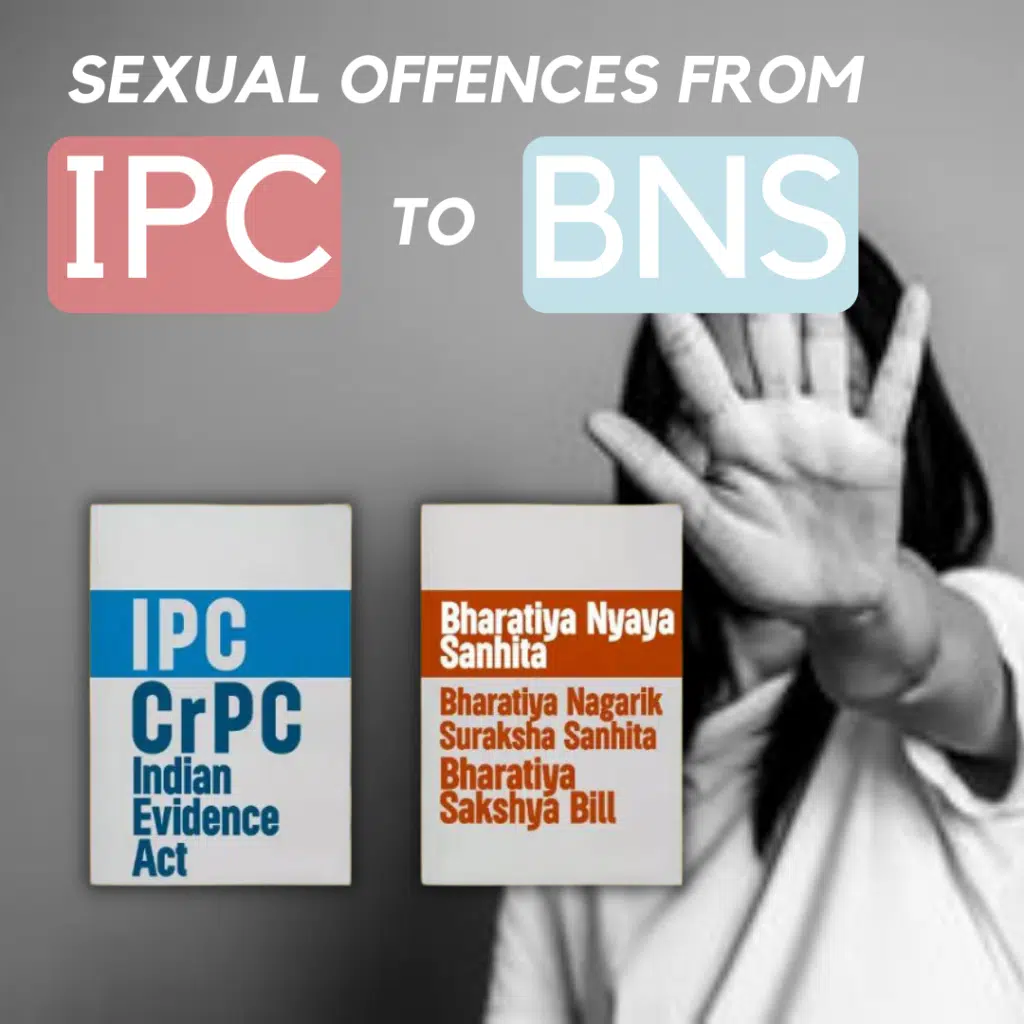
Authored By: Simran
Table of Contents
SEXUAL OFFENCES FROM IPC TO BNS
On August 11, 2023, Union Home Minister Amit Shah introduced three bills to the Lok Sabha aimed at revamping the criminal justice system in India.
The Indian Nyaya Sanhita, Bharatiya Saksh Bill, and Bharatiya Nagarik Suraksha Sanhita are three new laws that will replace the Indian Penal Code (1860), Indian Evidence Act (1872), and Code of Criminal Procedure (1973).
This essay aims to compare and contrast Bharatiya Nyaya Sanhita, 2023 with The Indian Penal Code, 1860. In this analysis we would use relevant legal codes as IPC or BNS.
Good Shifts
There have been many important changes caused by the recent implementation of Bharatiya Nyaya Sanhita (BNS). These changes may be better described under four main categories including: a) Step-by-Step Changes
Section sixty nine of the BNS has taken care of sexual activity through false marriage pretences or any other deceptive means which is a major shift.
For this offense a maximum term of ten years imprisonment and concurrently fined is applicable. Section one hundred eleven of BNS recognizes terrorism and terrorist activities for the first time in Indian jurisprudence.
“Any act in India or in any other country aimed at threatening unity integrity security of India or intimidating general public or any section thereof or disrupting public order is said to have been committed by a person as an act of terrorism,” states section one hundred eleven on the Bill of BNs.
A new law against “snatching,” under section 302 BNS carries maximum imprisonment sentence of three years as well as fines.
Death penalty; life imprisonment; minimum seven years’ imprisonment; fine – each member belonging to a group consisting five persons or more which murder someone by reason related to race, caste, community, sex, birth place, language, personal belief or any other grounds. c) Modern Terminology
Outdated and derogatory words like “lunatic person” and “person of unsound mind” have been removed from the BNS and replaced with “person with mental illness” or “having an intellectual disability”.
This change is evident in Sections 22 of the BNS (corresponding to Section 84 of the IPC) and 28(b) of the BNS (corresponding to Section 90(b) of the IPC).
Parity for Women
Girls below twenty one years old used to be prohibited from undertaking unrestricted sex with another person. The amended Section 139 of BNS (like Section 366B of IPC) extends this prohibition to also include boys under eighteen being imported for similar criminal acts in order address gender inequities within criminal law.
BNS seeks to give more details about criminal activities through its provisions on organized crime (Section 109) and minor organized crime or organized activities as a whole (Section 110).
In conclusion, this means that; BNS has implemented several progressive changes, it has become more sensitive in changing its wording; some provisions have been aimed at equality between genders; it has strengthened its fight against organised crime by introducing new regulations.
Stronger regulations on sexual misconduct have been passed by Bharatiya Nyaya Sanhita (BNS) which includes the following key changes; for rape, extended from seven to ten years.
The BNS section 70 and IPC Section 376DB has death penalty for gang-rape of females below eighteen years.
What does Section 70 of the BNS say about any individual who is found guilty of gang raping a girl under the age of eighteen? Alternatively, they may be sentenced to life in prison and fined such that their life will never change till their natural deaths come, along with a fine.
Novel Provision 2023 in Bhartiya Nyaya Sanhita
Section 69 is an addition to the provision of BNS dealing with offenses against women and children. In brief, therefore, the BNS has introduced tougher legislations relating to sexual assault like: severe penalties for rape; capital punishment for members of gangs that terrorize minors through rape; keeping secret identities of victims; adding provisions on offences against women and children in new clause. Five kinds of punishments are stated in Indian Penal Code (IPC), section 53:
- Capital punishment
- life in prison.
- Life Sentence, Two types of everlasting incarceration exist:
- Strict (demanding labor-intensive)
- Simple Property Forfeiture
- Fine.
- Property forfeiture
Nonetheless, this new statute also introduces community service as another form of penalty different from those mentioned above. In other words, instead going to jail these criminals might be required to work voluntarily without pay. For lesser offences under the BNS law, community service can be imposed as a sentence. This entails some specific amendments within various spheres including:
a) According to article 200(Bharatiya Nyaya Sanhita) equivalent to Section 168 (Indian Penal Code), if an employee working for government engages in trade contrary to his or her duty , civil servant may be penalized with fines or forced labour or even a simple prison term not exceeding one year. According to Section 354 of BNS, which is analogous to Section 499 of IPC, defamation violations are punishable by a fine, a community service requirement, or a brief jail sentence of up to two years.
b) Community Service for Attempted Suicide: BNS claims that community service may be applied as a kind of punishment in cases where suicide attempts have occurred. If the period, during which the person shall serve no more than twenty-four hours in jail due to his fault , among them is found guilty while drunkard and creating public nuisance, then they might choose to do community work instead. In summary, BNS expands the range of sanctions by permitting community service as a form of punishment, which can be used in lieu of jail time for a number of infractions.
c) The Sedition Law will be superseded:
The campaign should have focused on scrapping the sedition laws most important thing about Bharatiya Nyaya Sanhita (BNS).
Nonetheless, many of these provisions from the present sedition law which relate to acts that endanger India’s sovereignty, unity and integrity will continue to be subsumed under Section 150 of the BNS.
According to section 150 of the BNS Constitution, ‘anyone who intentionally or knowingly causes or attempts to cause secession, armed rebellion, subversion or promote separatist sentiments by endangering the sovereignty, unity or integrity of India shall be punishable.’
These include those who use spoken or written words, signs, visible representations, electronic communication means; financial resources among others.
In addition to a prison term ranging from seven years up to life in some cases he may also be required to pay a fine.
Adverse Effects and Unresolved Issues: Nonetheless, despite their mostly being seen as advantageous changes brought about by the BNS’ reforms there are still some great problems they bring about while others are yet unresolved yet.
One positive outcome that has come out of this Act is the inclusion of community service as a punishment. Nevertheless there is still confusion over this additional charge.
However since there is no clear definition of what it entails for instance it would be difficult in future for example when constructing sentences to avoid ambiguity. Also sometimes bizarre forms of community service have been prescribed.
For instance people were asked to distribute copies of Quran; give money to gaushalas(cow refuges) or offer their services at temples. Probably even if some were later revoked it’s possible that more exist with religious undertones similar in nature or potentiality harmfulness.
Therefore it becomes important either coming up with a list what could constitute an appropriate community service initiative or guidelines for right conduct in relation thereto.
The advancement towards gender neutrality in cases involving sexual assault and rape
This implies recognizing that rape and sexual assault laws should apply equally across all genders including men women and transgender people but so far not much progress has been made on sexual assault and rape laws in that direction.
One of the major milestones was reached in 2019 when a bill seeking to gender-neutralize Indian criminal laws was introduced by a private member. However, just like the Indian Penal Code (IPC), the BNS still identifies men as offenders in similar circumstances while only considering women as victims of rape and sexual assault.
CONCLUSION:
The new proposed law is expected to bring about a paradigm shift in India’s criminal justice system, making it more responsive to public demands and equitable, effective, and efficient. The new code is still at draft stage hence yet to be implemented. These proposed changes on Bhartiya Nyaya Sanhita are meant to update Indian legal system so as to make it more responsive to current problems and enhance its efficacy. It will have to go through prolonged processes of debates involving many stakeholders and experts before the Parliament can finalize, adopt it.



